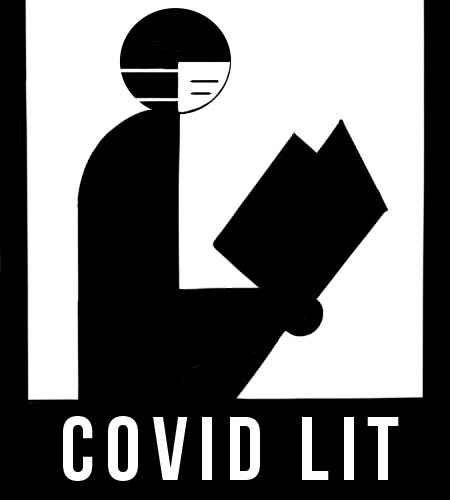FAQs
do submissions need to be about covid-19?
Heck no! This is not a temporary project to address the moment before fizzling away. The goal is for COVID LIT to become a standard-bearer in the online publishing world. Of course, we’d love to see work that is shedding light on the pandemic for obvious reasons, but we’re interested in featuring anything about anything.
why is the submission process so convoluted?
This operation is funded by one person: a creative writing professor in the Deep South. While there are options for a cost-effective submission manager, it doesn’t quite have the capabilities we would need to accept both submissions and screenshots. For the time being, email is the best bet. We recently started a GoFundMe page in order to raise money to help us advertise more and subscribe to a submission management service that would ease the procedure for both writers as well as Brian (Editor-In-Chief). If you’d like to help COVID LIT out directly with a donation, click here.
what do you look for in a submission?
Refer to our Submission Guidelines for more info on that. The short of it: something that feels urgent crafted with delicious sentences.
i am not from the us? can i still submit and donate?
Hell yeah! We want to feature work that spans the globe! Your donation can go to any nonprofit, as well. The running total for donations is measured in US dollars, but I have converted several donations in other currencies to US dollars to account for everybody’s contributions.
I’m not a writer; I’m just here to read. Can i donate, too?
Hell yeah, you can donate! Check out the Organizations We Dig page or go to your favorite secular, non-partisan nonprofit’s website, donate, and send an email to editor@covidlit.org with the subject line [Reader Donation]. Feel free to write a message in the body of the email, but, most importantly, attach a screenshot of your donation confirmation page that shows how much you donated. We will add your donation amount to our running total. If you want to donate to COVID LIT’s GoFundMe, click here.
how often do you plan on publishing?
In these early-goings, we’ve been receiving a lot of submissions—great ones nonetheless! At this rate, we are hoping to be able to publish new work every two weeks. If things slow down, we may push it to once a month. We anticipate publishing 2-3 pieces at a time.
What about interviews? Book reviews? Readings?
Yes. All the above, please! We want to do a heck of a lot more than publish creative writing. We’re looking into many ideas, including YouTube content, Facebook Live and/or Instagram readings, and, of course, interviews. Brian is currently doing everything he can to get interviews with some of the biggest names in contemporary writing and has received a lot of “no’s” and many ignored requests. No hard feelings; it happens, especially with a brand-new, unproven publication. Still, we’ll keep trying and, soon enough, we’ll bring you some damn good content beyond the damn good stories, essays, and poems we expect to publish.
why did you start this?
Two reasons. First, once my employer suspended face to face courses for the Spring 2020 semester and we moved online, that left one of my students in an awful predicament. This student didn’t own a computer, meaning they relied on on-campus technology to submit his work. Once they arrived home, the only device they could use to complete research, readings, and papers was their mobile phone using their data plan. So many students are not in a position to succeed in online teaching, and I wanted to do something about it. This is when I found One Laptop Per Child (see “Organizations We Dig”), which led down a rabbit hole of other nonprofits in need. Second, once lock-downs were first ordered, I saw a lot of writers declare that our duty during these times is to create and share our myriad perspectives with the reading world. While I agree that this is unquestionably important, I also thought about what a privilege it is—during a time when millions are losing their jobs and livelihood while thousands are dying, struggling to find a meal, incapable of affording a doctor’s visit, etc.—to be able to focus on our art. I have been able to work from home, earn my paycheck, and, yes, make time for writing, which is a privileged position in which to be. But, in all honesty, considering how isolated the literary community is from the rest of the world (those who could really use our perspectives to get through their traumas and tribulations) creation simply isn’t enough. I wanted to figure out a way to ensure that writers understood that writing has never been just about showcasing work to other writers and those in and around academia. Writing, or art in general, exists in order to teach empathy and, with that, inspire change. The model for this magazine was born from the idea that writers, when mobilized, can actually use their creative powers to do amazing things for other people—especially those who may never learn that our unique perspectives exist in magazines they may never cross. This is why one of our primary goals is to find ways to bridge the divide between the literary community and the larger reading community. There are so many great writers who deserve to be read by a larger readership, and we’re investing significant time in researching trends in hopes of introducing readers to their new favorite writers.
